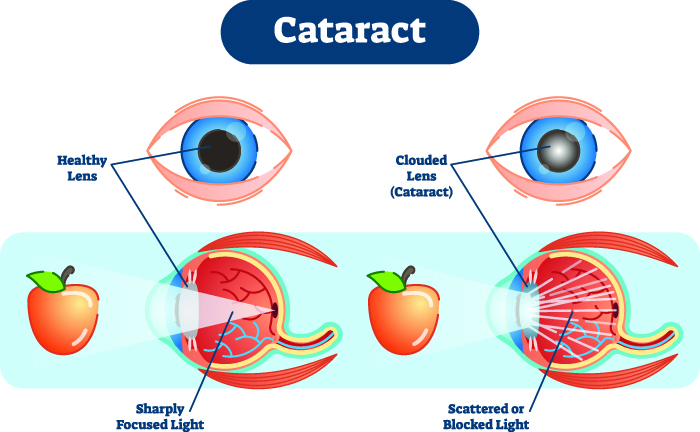Cataract Surgery in Sadashiv Peth, Pune
A cataract is a condition where the lens of the eyes gets cloudy. It makes it difficult for the patient to read, understand expressions on faces, and even drive. Cataract grows slowly, where you might not notice the symptoms in the early stages. But in time, you will have to undergo treatment to get rid of the disorder. When the condition is still at its initial stages, strong lighting and glasses can help you out while at later stages, you will need to undergo surgery.

Symptoms
- The patient becomes clouded, blurred, or dimmed
- Vision difficulty at night
- You might feel sensitivity to light
- You might read brighter light to read
- You may notice halos around the light
- Frequent changes in eye power
- Double vision in one eye
- You may notice the colors fading or becoming yellow
If you notice changes in your vision or feel experience cloudy vision, visit a doctor immediately.
Request an appointment at Apollo Spectra Hospitals, Pune
Call 1860-500-2244 to book an appointment
Causes
Mostly, cataracts develop due to an injury or aging. However, some genetic conditions can lead to the development of this disorder too. Cataracts can also be the result of other eye injuries, such as eye surgery, long-term use of steroids, and certain medical conditions. Some of the risk factors include;
- Aging
- Diabetes
- Too much sunlight exposure
- Smoking
- Obesity
- High blood pressure
- Eye injury
- Eye surgery
- Using steroids for long
- Drinking too much alcohol
Diagnosis
When you go to the doctor with your symptoms, a few tests might be conducted. They are;
Visual Acuity Test: Here, an eye chart is used by the doctor to see how well you can read the letters written on the chart. One eye is covered while you have read the chart with another eye and vice versa. With this, your doctor will check have you have 20/20 vision or an impairment.
Slit-lamp Examination: With the help of a slit-lamp, your doctor will be able to take a look at the structures of your eyes under magnification. This microscope is known as the slit-lamp because it produces excessive light to put light on the iris, cornea, and the structure of the eyes. So, even if there are any abnormalities, they can easily be detected with this method.
Retinal Exam: Your eyes are dilated to prepare for the retinal exam, meaning, they are kept wide open with the help of eye drops. Now, with a special device known as the ophthalmoscope, your doctor will check for any signs of cataracts.
Treatment
Generally, your doctor will suggest surgery when the condition starts interfering with your life and you are unable to perform even the mundane activities, such as reading or driving. Cataracts don’t damage the eyes, so you don’t have to rush to get the surgery done if you don’t want to. However, for people suffering from diabetes, the condition can worsen quite quickly. If you think surgery is not the right route for you, you can always talk to your doctor where periodic follow-ups will be recommended to see the progress of the cataract.
During the surgery, the clouded lens is removed and replaced with an artificial lens to help you to see clearly. Known as the intraocular lens, it is placed exactly where your original lens was before. It is usually an outpatient procedure, which means, you will not have to stay in the hospital overnight. You might experience mild discomfort after the surgery and the recovery period is about eight weeks.
There is no exact way to prevent the condition. However, the below factors can be helpful;
- Opt for regular eye exams
- Quit smoking
- Manage other health issues, such as diabetes
- Consume a healthy diet
- Wear sunglasses when you step outside
- Don’t overconsume alcohol
- If you use eyeglasses or contact lenses, make sure they are as accurate as possible
- If you need more help with your reading, you can use a magnifying glass
- Always wear sunglasses if you are going out
- Avoid driving at night
After the surgery, your eye is bandaged and the recovery period takes up to eight weeks. After that, for the first few days, you will have to use dark glasses as you need to avoid intense light falling on your eyes.
Symptoms
Our Doctors
DR. VANDANA KULKARNI
MBBS, MS, DOMS...
| Experience | : | 39 Yeras Experience |
|---|---|---|
| Speciality | : | Ophthalmology... | Location | : | Sadashiv Peth |
| Timings | : | Available on prior a... |
Our Top Specialities
NOTICE BOARD
CONTACT US
CONTACT US
 Book Appointment
Book Appointment



.svg)
.svg)
.svg)
.svg)








